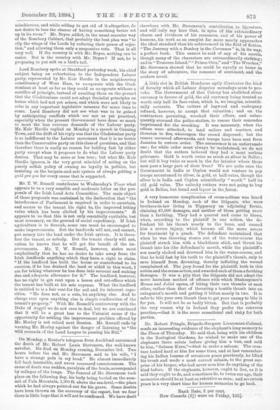A very humorous complication of cross-actions was heard in Ireland
on Monday, each of the litigants, who were brothers-in-law living in Tipperary on adjoining farms, claiming £1,000 damages, and neither of them getting more than a farthing._ They had a quarrel and came to blows, when, according to the plaintiff in one action, the de- fendant bit his thumb nearly to the bone, and caused him a severe injury, which became all the more severe for treatment by a quack. The defendant maintained that when he was throwing stones out of the water-course the plaintiff struck him with a blackthorn stick, and thrust his thumb into his (the defendant's) mouth, while the plaintiff's son nearly choked and drowned him in the water-course, and that he held fast by his teeth to the plaintiff's thumb, only to save himself from drowning, thereby inflicting the wound complained of. The jury found for the plaintiff, both in this aotion and the cross-action, and awarded each of them a farthing damages. It was a pity that the litigants did not adopt the more harmless method of offence with which Shakespeare's _Romeo and Juliet opens, of biting their own thumbs at each other, rather than that of thrusting a hostile thumb into an antagonist's mouth and getting it bitten nearly in two. It is safer to bite your own thumb than to get your enemy to bite it for you. It will not be so badly bitten. But that is probably the very reason why in Ireland they prefer the converse practice,—that it is the more sensational and risky for both parties.

































 Previous page
Previous page